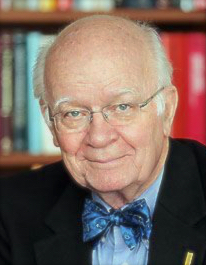The Prosperity (Anti-)Gospel
Pastor Rick Henderson’s name may not be familiar to many readers, but he recently preached a sermon and wrote a report which he hopes will reach publics new to his chosen theme
By Martin E. MartyJuly 23, 2018
 Pastor Rick Henderson’s name may not be familiar to many readers, but he recently preached a sermon and wrote a report which he hopes will reach publics new to his chosen theme. In a recent blast mediated through The Huffington Post, he gets our attention by announcing that after twenty years of preaching, he broke precedent and “called out false teachers and named them by name.” The two he singled out were Joel Osteen and Joyce Meyer. Their names supplant those of predecessors from previous generations who, by now, have faded. First there was Norman Vincent Peale with his “positive thinking” and, decades more recently, Robert Schuller, whose famed Chrystal Cathedral has been replaced by a Catholic edifice as his “possibility thinking” became difficult to sell any longer.
Pastor Rick Henderson’s name may not be familiar to many readers, but he recently preached a sermon and wrote a report which he hopes will reach publics new to his chosen theme. In a recent blast mediated through The Huffington Post, he gets our attention by announcing that after twenty years of preaching, he broke precedent and “called out false teachers and named them by name.” The two he singled out were Joel Osteen and Joyce Meyer. Their names supplant those of predecessors from previous generations who, by now, have faded. First there was Norman Vincent Peale with his “positive thinking” and, decades more recently, Robert Schuller, whose famed Chrystal Cathedral has been replaced by a Catholic edifice as his “possibility thinking” became difficult to sell any longer.
Sightings is paying attention to these waning bestselling princes of the pulpit and prophets of the airwaves by noticing what most now call the “Prosperity Gospel.” It is easy to let it pass unnoticed unless you belong to, or are alert to, what gets sold as the Christian Gospel, or something congruent with it, on cable TV, at many mega-churches, and through specialized but nonetheless popular books. We would no doubt continue to let it pass by had La Civiltà Cattolica not recently featured and condemned this Gospel as “Dangerous and Different.” That paper legitimately advertises itself as “Reflecting the Mind of the Vatican Since 1850,” and it is in place to say that it shines with the light of the Vatican.
In the July 18 issue, Antonio Spadaro, SJ, and Marcelo Figueroa credibly claim that they are transmitting the ideas of Pope Francis, who has often warned against the threat of this theology that can “overshadow the Gospel of Christ.” It is a type of Christianity that “places the well-being of the believer at the center of prayer, and turns God the Creator into someone who makes the thoughts and desires of believers come true.” The authors relate this to “the so-called ‘American Dream,’” but then go on to show how this Prosperity Gospel has also prospered in Africa, Asia (especially China), and Latin America (Central and South). The Vatican writers trace much of this to a New York pastor, Esek William Kenyon (d. 1948), but there are many sources. In recent years, Kenneth Hagin (d. 2003) was the main inspirer, who took the word of Jesus in Mark 11:23-24—look it up!—and, with Kenyon, utilized mass media to score. More names? Oral Roberts, Pat Robertson, Benny Hinn, Robert Tilton, et cetera. With or without Pentecostal roots and ties, they have swept the field.
The “pillar” assurances bought and sold in this context are two: “economic well-being and health.” Further, “[t]here can be no compassion for those who are not prosperous, for clearly they have not followed the rules and thus live in failure and are not loved by God.” Pay up, they appeal, in order to get paid. Preacher Gloria Copeland got the Vaticanists’ attention with her appeal: “Give a dollar for love of the gospel and you’ll get one hundred … Give one car and the return would furnish you a lifetime of cars. In short, Mark 10:30 is a very good deal.” “When all is said and done,” the authors point out, “we are speaking here of a God who is made in the image and likeness of the people and their situation, and not according to the biblical model.”
The conclusion in our political world? “[T]he United States has grown as a nation under the blessing of the providential God of the Evangelical movement.” Careful: some of our best friends are evangelicals, and we note that many of them offer the best critiques of this “Gospel.” Not a few evangelicals and post-evangelicals are the most profound analysts of the Prosperity Gospel, and they seek to counter it. Spadaro and Figueroa quote Pope Francis, who scourges the Prosperity Gospelers, but who also discriminates and encourages those, Americans and others, who see salvation as “a gift, the same gift that Jesus had received to give.” They conclude by arguing that the Prosperity Gospel is “a far cry from the positive and enlightening prophecy of the American Dream that has inspired many … far from the ‘missionary dream’ of the American pioneers, and further still from the message of preachers like Martin Luther King.” Consider such words a blessing from the Vatican.
Image: Joel Osteen preaching at Lakewood Church, July 17, 2016 | Photo Credit: RobertMWorsham (cc)
 Martin E. Marty (PhD’56) is the Fairfax M. Cone Distinguished Service Professor Emeritus of the History of Modern Christianity at the University of Chicago Divinity School. His biography, publications, and contact information can be found at www.memarty.com. Martin E. Marty (PhD’56) is the Fairfax M. Cone Distinguished Service Professor Emeritus of the History of Modern Christianity at the University of Chicago Divinity School. His biography, publications, and contact information can be found at www.memarty.com. |
Sightings is edited by Brett Colasacco (PhD’18). Sign up here to get Sightings by email. You can also follow us on Facebook and Twitter.


